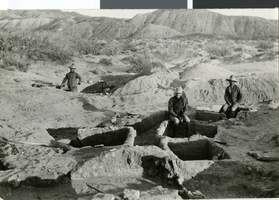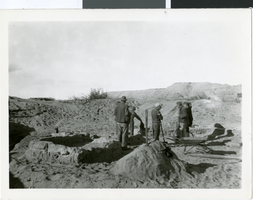Search the Special Collections and Archives Portal
Search Results
R. F. "Chick" Perkins Papers
Identifier
Abstract
The R.F. “Chick” Perkins Papers date from 1900 to 1990, with the bulk from 1930 to 1990, and document the history of Native Americans and the archaeology of Southern Nevada. The collection contains photographs, correspondence, professional papers, official documents, and publications belonging to Richard Fay "Chick" Perkins, who served as curator of the Lost City Museum in Overton, Nevada, from 1956 to 1980.
Archival Collection

Postcard of adobe ruins, Pueblo Grande de Nevada, circa mid to late 1920s
Date
Archival Collection
Description
Image
Pueblo Grande de Nevada Photograph Collection
Identifier
Abstract
The Pueblo Grande de Nevada Photograph Collection (approximately 1920-1980) contains black-and-white photographic prints, negatives, and slides depicting archaeological sites located in Overton, Moapa, Valley of Fire, Red Rock, Pyramid Lake, Kane Springs, Virgin River, the “Lost City,” and Lake Mead, Nevada. Images display the different stages of digging during the archaeological excavation of Pueblo Grande de Nevada. Also included are images showcasing artifacts uncovered during the excavations, the Saint Thomas, Nevada and the flooding of archaeological sites after the construction of the Hoover (Boulder) Dam.
Archival Collection
Lost City (historical)
Authority Link
No description.
Broader
Feature
Geographic Location
Richard "Chick" Perkins oral history interview
Identifier
Abstract
Oral history interview with Richard "Chick" Perkins conducted by an unidentified interviewer on February 5, 1974 for the Boyer Early Las Vegas Oral History Project. In this interview Perkins responds to questions about the history of the city of Las Vegas, Nevada, the Pueblo de Grande archaelogical site, and the Lost City, Museum in Overton, Nevada. He provides a detailed response to questions about the indigenous peoples of the southern Nevada area, looking at their customs, culture, and perceptions regarding white settlement in the area.
Archival Collection

Photograph of Pueblo Grande de Nevada, 1926
Date
Archival Collection
Description
Image
Southern Nevada photographs, 1863-1960
Level of Description
Scope and Contents
The Southern Nevada photographs depict towns, mines, railroads, workers, and settlers in Southern Nevada from 1863 to 1960. The photographs primarily depict Native American petroglyphs, desert landscapes, mines and mining machinery, and the archaeological dig at Pueblo Grande de Nevada (also known as the Lost City). The photographs depict the towns of Virginia City, Beatty, Genoa, Searchlight, Rhyolite, St. Thomas, Lost City, Pioche, and Overton. The items described include black-and-white photographic prints, postcards, negatives, and slides; items listed are photographic prints unless otherwise specified.
Archival Collection
Pagination
- Previous page ‹‹
- Page 5
Archival Component
Willis Clark Evans oral history interview
Identifier
Abstract
Oral history interview with Willis Clark Evans conducted by Bernard Timberg on February 5, 1974 for the Ralph Roske Oral History Project on Early Las Vegas. In this interview, Evans discusses his father, Native American archaeologist Willis Lyman Evans, his mother, Jessie Dave Evans, his uncle, Henry "Hank" Dave as he recounts his upbringing and family history. He shares memories of family trips around the United States, hunting trips, learning traditional crafts from his father, finding artifacts, and visiting Richard "Chick" Perkins at the Lost City Museum. He also recounts stories about his mother and her Shoshone family, including stories about his uncle's experiences as a ranch worker in Northern Nevada.
Archival Collection
